(Exodus 4:24-26) Did God Really Want to Kill Moses Because His Son Was Not Circumcised?
“On the way to Egypt, at a place where Moses and his family had stopped for the night, the LORD confronted him and was about to kill him. But Moses’ wife, Zipporah, took a flint knife and circumcised her son. She touched his feet with the foreskin and said, ‘Now you are a bridegroom of blood to me.’ (When she said ‘a bridegroom of blood,’ she was referring to the circumcision.) After that, the LORD left him alone.” (Exodus 4:24-26)
 What? Just as Moses is about to begin the work God told him to do, God confronts him with the intent to kill him? This fact alone appears to be contradictory when we back up in the story and see its full context.
What? Just as Moses is about to begin the work God told him to do, God confronts him with the intent to kill him? This fact alone appears to be contradictory when we back up in the story and see its full context.
The first chapters of the book of Exodus tell the story of the grinding oppression of God’s people in the land of Egypt under the heavy hand of Pharaoh. We are gripped by the captivating story of Moses who escaped the death decree of Pharaoh in a floating basket, only to become a member of Pharaoh’s extended household as a prince of Egypt.
What destiny awaited Moses after cheating certain death and finding entrance into the corridors of power? For forty years he is groomed to be the next pharaoh, and he is perceived by the Egyptians as having the skill and capability to become a great leader for their nation. But Moses never forgets his heritage and, aware of the persecution of his people and cognizant of his special destiny, steps into a position to save God’s people by killing an Egyptian slave master (Exodus 2:11-15).
 This violent move on the part of Moses required him to flee into the desert and into apparent oblivion. For forty years he cared for sheep and learned the tender skills of a shepherd in the land of Midian (Saudi Arabia) under the tutelage of Jethro the priest. It was here where Moses met and married Jethro’s daughter, Zipporah. It took a long time for the violent principles in which he had been schooled to be subdued. Then God calls him back to Egypt to deliver His people. God tells Moses about the miracles he will do in Egypt and how Pharaoh is going to respond, but Moses has lost all confidence in his own abilities. God eventually persuades him, telling him that his brother Aaron can help him, and at eighty years old Moses is finally prepared to do what God has called him to do. It is as Moses makes his way to Egypt, when we come across the strange event of when “the LORD confronted him and was about to kill him” because his son was not circumcised.
This violent move on the part of Moses required him to flee into the desert and into apparent oblivion. For forty years he cared for sheep and learned the tender skills of a shepherd in the land of Midian (Saudi Arabia) under the tutelage of Jethro the priest. It was here where Moses met and married Jethro’s daughter, Zipporah. It took a long time for the violent principles in which he had been schooled to be subdued. Then God calls him back to Egypt to deliver His people. God tells Moses about the miracles he will do in Egypt and how Pharaoh is going to respond, but Moses has lost all confidence in his own abilities. God eventually persuades him, telling him that his brother Aaron can help him, and at eighty years old Moses is finally prepared to do what God has called him to do. It is as Moses makes his way to Egypt, when we come across the strange event of when “the LORD confronted him and was about to kill him” because his son was not circumcised.
 Would God suddenly change His mind, turn His back on eighty years of preparation, and just kill Moses there in the desert? Was God going to kill Zipporah’s husband and leave her children fatherless? The puzzlement only deepens as the story continues. Zipporah suddenly springs to action, circumcises their son and throws the foreskin at the feet of Moses and calls him a bridegroom of blood. Then when the circumcision is complete, God drops His intent to kill Moses. What on earth is this all about?
Would God suddenly change His mind, turn His back on eighty years of preparation, and just kill Moses there in the desert? Was God going to kill Zipporah’s husband and leave her children fatherless? The puzzlement only deepens as the story continues. Zipporah suddenly springs to action, circumcises their son and throws the foreskin at the feet of Moses and calls him a bridegroom of blood. Then when the circumcision is complete, God drops His intent to kill Moses. What on earth is this all about?
Apparently, Zipporah didn’t want to have her son circumcised according to the law of Israel. Is Moses to die for having delayed in performing this rite? To the candid reader, God appears to be very petty about this issue. It doesn’t make Him look stable. Apparently, God would break up a family, leave a woman husbandless and her children fatherless, just to ensure Moses circumcises his son.
Three Interpretations
There are three main interpretations of what’s going on in this story. The first one we’ll briefly mention is the more popular understanding, and that’s simply that God says what He says and means what He says so don’t mess around with Him or He’ll execute His death decree upon you by directly killing you. This is the more popular understanding because most people have the preconceived idea that the punishment of sin comes directly from an angered Lawgiver (God) and is not a natural consequence which comes directly from the sin. I personally do not believe that God was going to kill Moses, therefore I do not adhere to this interpretation.
Another interpretation can be found in the apocryphal book of Jubilees, where an angel is reciting to Moses the events that have led up to his journey to Mt Sinia. In chapter 48, the angel recites the story which is the focus of our discussion:
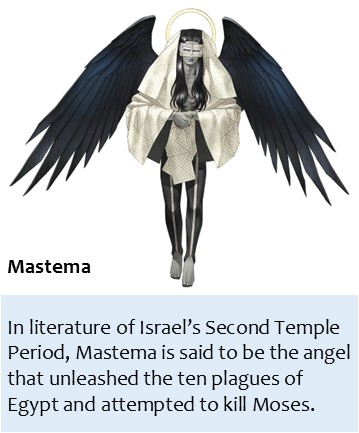 “You know what He [God] said to you on Mount Sinai, and what prince Mastema desired to do with you when you returned to Egypt. Did he (Mastema) not seek to kill you with all his power and to deliver the Egyptians from your hand when he saw that you were sent to execute judgment and to take revenge on the Egyptians?” (Jubilees 48:2-3)
“You know what He [God] said to you on Mount Sinai, and what prince Mastema desired to do with you when you returned to Egypt. Did he (Mastema) not seek to kill you with all his power and to deliver the Egyptians from your hand when he saw that you were sent to execute judgment and to take revenge on the Egyptians?” (Jubilees 48:2-3)
Here, the angel is quoted as saying that it was “prince Mastema” who sought to kill Moses. Mastema “is the demon or angel who appears in the Book of Jubilees … [He is] the angel of disaster, the father of all evil, and a flatterer of God. In some scriptures, it is said that he became a fallen angel. He first appears in the literature of the Second Temple Period as a personification of the Hebrew word mastemah (מַשְׂטֵמָה), meaning ‘hatred’, ‘hostility’, ‘enmity’, or ‘persecution’” (Wikipedia).
So Mastema is really Satan himself. But is this a stretch, or even a deception, to replace “the Lord” with Satan in this story? Not necessarily. We also have the same thing happening in Scripture when we read the story of David numbering the people. In the book of 2 Samuel, it’s written as follows:
“Again the anger of the Lord was aroused against Israel, and He [the Lord] moved David against them to say, “Go, number Israel and Judah.” (2 Samuel 24:1)
However, when Ezra recounts this story, he says it differently:
“Now Satan stood up against Israel, and moved David to number Israel.” (1 Chronicles 21:1)
This is the same thing that’s going on between Exodus 24 and Jubilees 48. If Jubilees were to recount this story, it may have said, “Now prince Mastema stood up against Israel, and moved David to number Israel.” The understanding of why two different names only means that it wasn’t really the Lord who directly caused David to number Israel, but that He removed His protective presence from a persistent David (who had already made up his mind) and permitted Satan to cause David to sin. This is in fact how God’s anger and wrath are executed all throughout Scripture. (Please see my article entitled, What is God’s Wrath?).
Another example of this is found in Jubilees chapter 49 where Mastema is attributed with slaying the firstborn in the land of Egypt, which is also attributed to the Lord.
- Exodus 12:12: “For I will pass through the land of Egypt this night, and will smite all the firstborn in the land of Egypt, both man and beast; and against all the gods of Egypt I will execute judgment: I am the LORD.”
- Jubilees 49:2: “For on this night –the beginning of the festival and the beginning of the joy- ye were eating the passover in Egypt, when all the powers of Mastema had been let loose to slay all the first-born in the land of Egypt, from the first-born of Pharaoh to the first-born of the captive maid-servant in the mill, and to the cattle.”
This understanding does ring true for in Exodus 12:23 the killer of the firstborn is indeed attributed to “the Destroyer” by Moses— “when He [the Lord] sees the blood upon the lintel, and on the two side posts, the LORD will pass over the door, and will not permit [let loose] THE DESTROYER to come into your houses to slay you.” This “Destroyer” is also mentioned by Paul in 1 Corinthians 10:10. The Greek word Paul uses for “Destroyer” is ὀλοθρευτής (olothreutés) which means “venomous serpent”, whom we all know is “that old Serpent, called the Devil, and Satan, who deceives the whole world” (Revelation 12:9). For a deeper look into this, see my articles entitled, Who Really Killed the Firstborn in Egypt? and Did God "Pass Over" the Israelites or Stand Guard and "Protect" Them?
However, although I believe that many times in Scripture God is said to “do” that which He reluctantly “permits” Satan to do (as the book of Job teaches us as well), I do have issues with the Book of Jubilees in general and, although some concepts of understanding may be correct, I do not believe it is divinely inspired. Apart from the Ethiopian Orthodox Church, the book is not considered canonical by most scholars nor within any of the denominations of Judaism.
If we look into the context of this story found in Jubilees you will see one example of why I question it. First, in Jubilees chapter 48, we have the mention that it was prince Mastema who desired to kill Moses to prevent him from going to Egypt in order to save the Egyptians from certain doom. But then, in chapter 49, we read that it was Mestama who killed all the firstborn. Do you see the contradiction? With that said, I believe a third option for interpretation is more likely, but it will take a little time to explain.
First of all, I do believe the story is correct by saying it was “the Lord”, or as the Septuagint (Greek translation of the Hebrew Scriptures) suggests, “the Angel of the Lord” who confronted Moses and his family. Admittedly, on a surface level, it does sound like a “Do what I tell you or I will kill you!” type of scenario. However, did Jesus ever say that to anyone? There is no record of Him ever saying this. Scripture is clear that when we read how Jesus lived and treated sinners, we see how the Father lives and treats sinners (Luke 6:27-36; John 14:9; 17:3-4; Hebrews 1:1-3). So, this story easily fails the Gospel Character test as we apparently see two contrasting characters between “The God of the Old Testament” and “the God of the New Testament.” When we see this test violated, it means that the Mirror Principle is operating: our natural way of reading this passage shows something in humanity that is being projected onto God. As I said, this will take some time to explain, so let’s begin.
Israel and Circumcision
Since our story involves circumcision, we need to step back in history to look at the context for where circumcision began for Israel. This would be in the time of Abraham. The covenant God made with Abraham was that He would make Abraham a great nation and that his children would be as numerous as the stars of heaven. When God first spoke to Abraham about this, Abraham simply believed what God said, and Abraham was accounted righteous as a result.
 “Then He brought him outside and said, ‘Look now toward heaven, and count the stars if you are able to number them.’ And He said to him, ‘So shall your descendants be.’ And he believed in the LORD, and He accounted it to him for righteousness.” (Genesis 15:5-6)
“Then He brought him outside and said, ‘Look now toward heaven, and count the stars if you are able to number them.’ And He said to him, ‘So shall your descendants be.’ And he believed in the LORD, and He accounted it to him for righteousness.” (Genesis 15:5-6)
Circumcision, however, was given as a sign of the covenant God was making with Abraham. In other words, circumcision came later as a visual symbol of that promise.
“And God said to Abraham: ‘As for you, you shall keep My covenant, you and your descendants after you throughout their generations. This is My covenant which you shall keep, between Me and you and your descendants after you: Every male child among you shall be circumcised; and you shall be circumcised in the flesh of your foreskins, and it shall be a sign of the covenant between Me and you. He who is eight days old among you shall be circumcised, every male child in your generations, he who is born in your house or bought with money from any foreigner who is not your descendant. He who is born in your house and he who is bought with your money must be circumcised, and My covenant shall be in your flesh for an everlasting covenant. And the uncircumcised male child, who is not circumcised in the flesh of his foreskin, that person shall be cut off from his people; he has broken My covenant.’” (Genesis 17:9-14)
Paul makes it clear that Abraham believed in God’s covenant and was accounted righteous before he was circumcised:
“Now, is this blessing only for the Jews, or is it also for uncircumcised Gentiles? Well, we have been saying that Abraham was counted as righteous by God because of his faith. But how did this happen? Was he counted as righteous only after he was circumcised, or was it before he was circumcised? Clearly, God accepted Abraham before he was circumcised! Circumcision was a sign that Abraham already had faith and that God had already accepted him and declared him to be righteous— even before he was circumcised. So Abraham is the spiritual father of those who have faith but have not been circumcised. They are counted as righteous because of their faith.” (Romans 4:9-11)
If Abraham was considered righteous by God for his faith, then why did God need to give Abraham a sign? Well, this is where Abraham’s faith faltered a bit:
“But Abram replied, ‘O Sovereign LORD, how can I be sure that I will actually possess it?’” (Genesis 15:8)
When God promised Abraham a great nation, he simply believed. When God promised to give him all the land to go with it, Abraham asked for some indication that this would happen. Why did he ask for this? Because he didn’t have the faith to believe God would do it without some sign first. We notice what Jesus says about asking for signs regarding things God has already promised:
“A wicked and adulterous generation seeks after a sign …” (Matthew 16:4)
We need to step through this carefully. In giving the sign to Abraham, God is helping Abraham transition from unbelief to belief. So, although it was a sign of the faith of Abraham, the need for that sign revealed the original unbelief that Abraham had. Unbelief is enmity towards God. It suggests that God can’t or won’t keep His word, which is an attack on His character. And this is the reason why Paul makes the following statements:
“For it makes no difference whether or not a man has been circumcised. The important thing is to keep God’s commandments.” (1 Corinthians 7:19)
“In fact, uncircumcised Gentiles who keep God’s law will condemn you Jews who are circumcised and possess God’s law but don’t obey it. For you are not a true Jew just because you were born of Jewish parents or because you have gone through the ceremony of circumcision.” (Romans 2:27-28)
Take note that Paul is actually separating circumcision from God’s Commandments. He clearly says there are "uncircumcised Gentiles who keep God's law." This may sound confusing since the law of circumcision is found in God’s law — The Torah (the first five books of Moses). Jewish tradition has calculated 613 commandments within the Torah (a word meaning, Instructions). However, this does not mean these are all necessarily God’s ideal instructions for holy living.
One example is found in Numbers chapter 15, where God “commands” the Israelites to make tassels (tzitzit) and attach them to the four corners of their clothing. Each tassel had to have at least one ribbon of blue:
 “Then the LORD said to Moses, ‘Give the following instructions to the people of Israel: Throughout the generations to come you must make tassels for the hems of your clothing and attach them with a blue cord. When you see the tassels, you will remember and obey all the commands of the LORD instead of following your own desires and defiling yourselves, as you are prone to do. The tassels will help you remember that you must obey all my commands and be holy to your God.’” (Numbers 15:37-40)
“Then the LORD said to Moses, ‘Give the following instructions to the people of Israel: Throughout the generations to come you must make tassels for the hems of your clothing and attach them with a blue cord. When you see the tassels, you will remember and obey all the commands of the LORD instead of following your own desires and defiling yourselves, as you are prone to do. The tassels will help you remember that you must obey all my commands and be holy to your God.’” (Numbers 15:37-40)
Today there are many Messianic Believers who advocate Torah observance who are strict in the instruction to wear these tassels, believing this instruction is part of God’s Commandments not to be disobeyed. However, notice carefully that this instruction was to remind them to keep God’s Commandments— “The tassels will help you remember that you must obey all my commands and be holy to your God.” Therefore, the wearing of tassels is not part of the Commandments. Today we tie a string around our finger to remember to do a certain task; we do not wear the string because that is the task, but to remember a task. See the difference?
Another example is the institution of animal sacrifices. Notice what God says through the prophet Samuel:
“What is more pleasing to the LORD: your burnt offerings and sacrifices or your obedience to his voice? Listen! Obedience is better than sacrifice, and submission is better than offering the fat of rams.” (1 Samuel 15:22)
Here again we see the difference between obedience to God’s Law and animal sacrifices. Many believe the only reason we are not to be offering animal sacrifices today is because there’s no temple, but once the temple is rebuilt, God will institute sacrifices again. It is even believed that animal sacrifices will continue during the Millennium, while some even believe for all eternity because it’s one of God's eternal rules. But if we are being obedient, why do we need sacrifices? Obedient to what? God’s Law. It was because of disobedience to God’s Law (i.e., unrighteousness) that animal sacrifices were instituted, and this is why obedience to God’s Law is better than offering animal sacrifices. Therefore, animal sacrifices are not a part of God’s eternal Law of selfless love (i.e., righteousness) although they are mentioned in the Torah. If man had always been obedient (submissive) to God’s Law, there would never have been any need for wearing tassels or animal sacrifices.
Likewise, circumcision was never meant to be a part of God’s ideal Instructions for righteous living, but only a seal (a reminder) that righteousness only comes from God, and we receive His righteousness by faith alone. Abraham was instructed to circumcise himself 13 years after Ishmael was born but before Isaac (the child of promise) was born. In his letter to the Philippian believers, Paul says, “For we who worship by the Spirit of God are the ones who are truly circumcised. We rely on what Christ Jesus has done for us. We put no confidence in human effort” (Philippians 3:3). The King James Version (as well as others) says we “have no confidence in the flesh.” This is why “the flesh” (the foreskin) was to be removed as a sign.
Abraham being instructed to circumcise himself between the births of Ishmael and Isaac was a sign to remind him that God’s promises will not be fulfilled through human effort. Ishmael was conceived due to Abraham’s lack of faith in God’s promise. He tried to fulfill God’s promise himself by having relations with Hagar while he was uncircumcised (flesh present). However, Isaac was conceived solely by the fulfillment of God’s promise while Abraham was circumcised (flesh absent), thus Isaac was the true child of promise. When Abraham fully believed in God’s promise, Scripture says, “He was fully convinced that God is able to do whatever he promises. And because of Abraham’s faith, God counted him as righteous” (Romans 4:21-22). Therefore, if man had always been obedient (submissive) to God’s word that His Law can only be fulfilled through us by His indwelling strength alone, there would never have been any need for wearing tassels, animal sacrifices, or circumcision.
God gave circumcision to Abraham as a way to lead him from the Old Covenant mindset to the New Covenant mindset.
- Old Covenant Mindset (Law written on stone) — Represents our stony (stubborn/unbelieving) heart in trying to do God’s works in our own strength.
- New Covenant Mindset (Law written in heart) — Represents permitting God to lay our glory in the dust and allow Him to do for us that which we have no power to do for ourselves.
The Origin of Circumcision
_1.jpg) The question we need to ask is why did God choose circumcision as a sign? Abraham’s unbelief required it, therefore what God brings to Abraham is a deeper revelation of what is in Abraham’s heart. When we study the origins of circumcision, we discover something very interesting.
The question we need to ask is why did God choose circumcision as a sign? Abraham’s unbelief required it, therefore what God brings to Abraham is a deeper revelation of what is in Abraham’s heart. When we study the origins of circumcision, we discover something very interesting.
“Sixth Dynasty (2345–2181 BCE) tomb artwork in Egypt has been thought to be the oldest documentary evidence of circumcision, the most ancient depiction being a bas-relief from the necropolis at Saqqara (c. 2400 BCE). In the oldest written account, by an Egyptian named Uha, in the 23rd century BCE, he describes a mass circumcision and boasts of his ability to stoically endure the pain:
‘When I was circumcised, together with one hundred and twenty men ... there was none thereof who hit out, there was none thereof who was hit, and there was none thereof who scratched and there was none thereof who was scratched.” (Wikipedia, History of Circumcision)
_2.jpg) Circumcision is first documented in Egypt and came into practice just before the time of Abraham. Circumcision was practiced in Egypt at the time of puberty. What is fascinating is that Ishmael’s mother, Hagar, was Egyptian, and when God asked Abraham to take the sign of circumcision into his family, his son Ishmael was 13 years old, being around the age of puberty. As an Egyptian, Hagar would have been very familiar with circumcision and may have requested Abraham for her son to be circumcised at puberty like it was done in Egypt.
Circumcision is first documented in Egypt and came into practice just before the time of Abraham. Circumcision was practiced in Egypt at the time of puberty. What is fascinating is that Ishmael’s mother, Hagar, was Egyptian, and when God asked Abraham to take the sign of circumcision into his family, his son Ishmael was 13 years old, being around the age of puberty. As an Egyptian, Hagar would have been very familiar with circumcision and may have requested Abraham for her son to be circumcised at puberty like it was done in Egypt.
“Abraham was ninety-nine years old when he was circumcised, and Ishmael, his son, was thirteen. Both Abraham and his son, Ishmael, were circumcised on that same day.” (Genesis 17:24-26)
As noted earlier, God instructed Abraham and the Hebrews saying, “He who is eight days old among you shall be circumcised.” This was far different from the Egyptians who circumcised their males around puberty. What’s even more interesting is the fact that at eight days old there is a natural spike in prothrombin and vitamin K which aids in the coagulation of blood! Today, it is not necessary to wait until the eighth day due to vitamin K shots given at the time of birth.
Immediately after God gave to Abraham the sign of circumcision, He once again promises to give Abraham a son through Sarah. Abraham is now almost 100 years old and Sarah is well beyond the normal age to bear children. When God gives the promise, the unbelief in Abraham is revealed.
“Then God said to Abraham, ‘Regarding Sarai, your wife—her name will no longer be Sarai. From now on her name will be Sarah. And I will bless her and give you a son from her! Yes, I will bless her richly, and she will become the mother of many nations. Kings of nations will be among her descendants.’ Then Abraham bowed down to the ground, but he laughed to himself in disbelief. ‘How could I become a father at the age of 100?’ he thought. ‘And how can Sarah have a baby when she is ninety years old?’ So Abraham said to God, ‘May Ishmael live under Your special blessing!’” (Genesis 17:15-18)
So, we see that Abraham did not believe God’s word. Instead, he wanted God to accept his own works in producing Ishmael. God’s commandment for circumcision appears to confirm Abraham’s desire for Ishmael to be the promised seed. Ishmael had reached the age of puberty, and according to Egyptian custom, he was to be prepared for manhood through this rite of passage.
He did the same thing earlier when He told Abraham to “Bring Me a three-year-old heifer, a three-year-old female goat, a three-year-old ram, a turtledove, and a young pigeon” (Genesis 15:9). In obedience, “Abraham presented all these to Him and killed them. Then he cut each animal down the middle and laid the halves side by side; he did not, however, cut the birds in half” (Verse 10). Then we read that the Lord walked between the halves of the carcasses and there made a covenant with Abraham to give him and his descendants all the land “from the border of Egypt to the great Euphrates River” (Verses 17-18). Here again we see the Lord condescending to enter into a covenant with Abraham, employing such forms as were customary among men for the ratification of a solemn engagement. (To understand this concept more, please see my articles entitled, Why Did God Command Abraham to Sacrifice Isaac? and Why Did God Institute Animal Sacrifices?).
Circumcision for the Egyptians was a sign of manhood, strength and the ability to endure great pain without complaining. It was a sacrifice of blood that served to unite the Egyptians as brethren. In the heart of man, we see the need for pain, blood and death in order to believe God. Here we see a symbol of the Cross once again. Here again is man’s enmity towards God in his belief that God needs man afflicted first before He will accept us. But God works with our warped ideas and transforms this symbol into a life-saving gift to the world. The concept of God giving man what they perceived should be done, such as circumcision and animal sacrifices, is found in the following verse:
by which they could not live.” (Ezekiel 20:25)
The Lord Mirrors Moses’ Thoughts
Both animal sacrifices leading to the death of Christ and fleshly circumcision were God’s way of accommodating man’s faulty understanding of Him and His ways. Due to our minds being corrupt with the disease of sin, man believes God cannot freely forgive without seeing blood as a payment for sin. Thus Jesus came and offered Himself as a sacrifice to free us from our faulty thinking. It was the only way we would believe God has forgiven us. Likewise, in the time of Abraham, it was impossible for the people to simply accept God’s promises without the bloody ceremony of circumcision. Therefore, whoever was not circumcised would be cut off from the chosen people. Not that God would be so enraged that He would violently kick them out or kill them, but by reluctantly giving them over to their own desire/thoughts/judgments etc. This mindset is brought out in The Parable of the Minas where the servant believed the master was “an austere [hard/severe] man” thus the master said, “Out of your own mouth I will judge you” or, as the New Living Translation says, “Your own words condemn you” (See Luke 19:11-27).
Circumcision became the path to life. Once again none of this reflects God’s thoughts. They are men’s thoughts and God meets men where they are to save them. This is the reason why Moses had to circumcise his son. Within his heritage, to not do this would bring disaster and the frown of God would be hanging over any Israelite who did not circumcise their sons. Thus, in order to free Moses from that fear, “the LORD confronted him and was about to kill him”— or at least that’s what Moses thought!
The Amplified Bible adds a little more commentary to the verse within brackets:
“Now it happened at the lodging place, that the LORD met Moses and sought to kill him [making him deathly ill because he had not circumcised one of his sons].”
This explains why his wife Zipporah performed the circumcision on their son and not Moses. Due to Moses’ self-condemning fear, he fell deathly ill at the presence of God just as those who witnessed the angel roll the stone away from Jesus’ tomb— “The guards trembled in fear of him and became like dead men” (Matthew 28:4). Because Moses’ unbelief, he perceived God to be “an austere man/God” thus God allowed his own thoughts to condemn him. The Lord appeared to Moses in the way Moses had perceived Him. This concept is brought out in the following verse:

It’s interesting that in the Young’s Literal Translation, it is worded like this: “with the perverse showest Thyself a wrestler.” This should draw our attention to the time of Jacob, when he was touched by the Lord while it was dark, but Jacob perceived He was an enemy, so he began to wrestle with the Lord (Genesis 32:22–30).
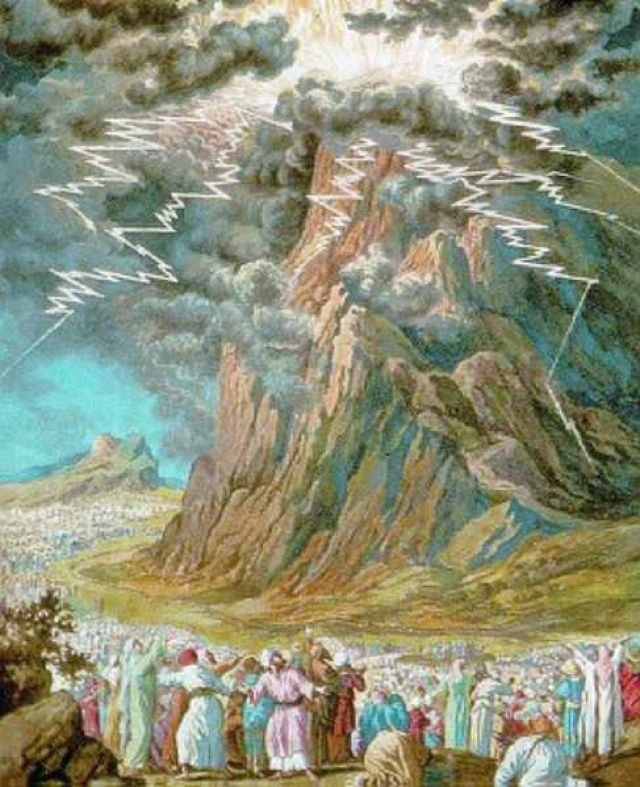
At the time when the Israelites encamped at Mt Sinai, the Lord descended upon the Mount and Scripture records, “And the sight of the glory of the LORD was like devouring fire on the top of the mount in the eyes of the children of Israel.” (Exodus 24:17). God appeared just as they had perceived Him to be— a god of thunder and lightning.
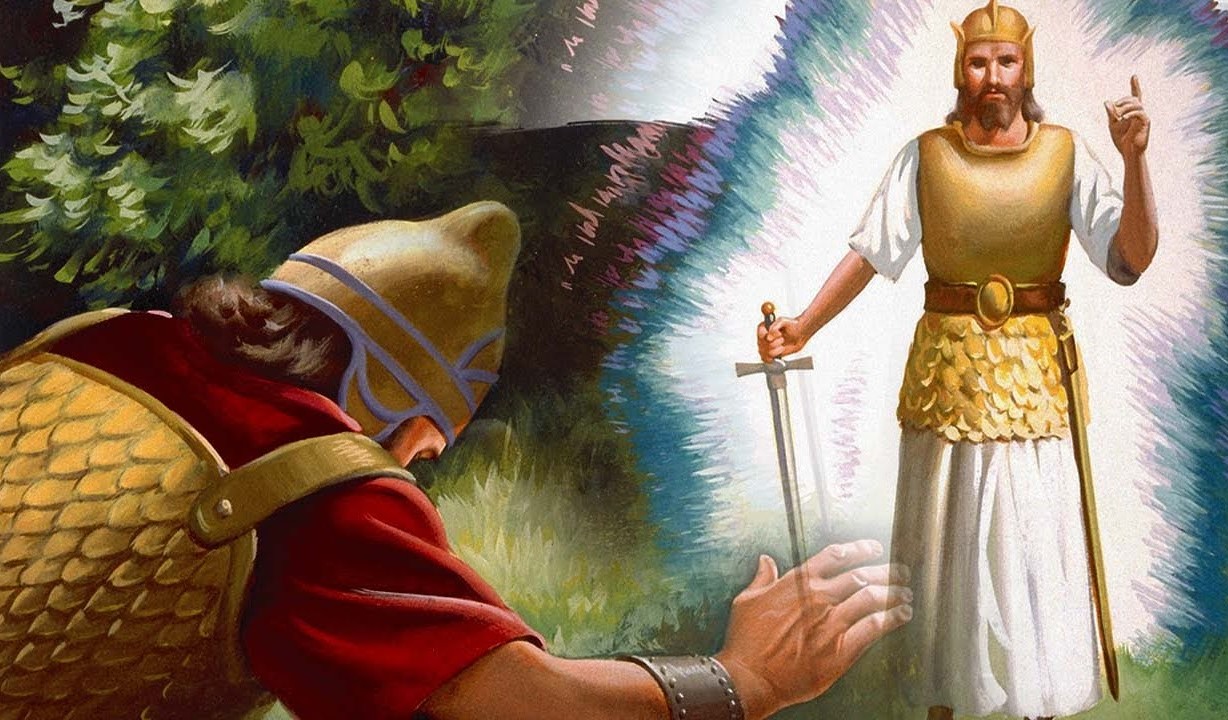
Then we see the Lord appearing to Joshua, again mirroring the type of God Joshua perceived God to be: “And it came to pass, when Joshua was by Jericho, that he lifted his eyes and looked, and behold, a Man stood opposite him with His sword drawn in His hand. And Joshua went to Him and said to Him, ‘Are You for us or for our adversaries?’” (Joshua 15:13).
Due to the fact Zipporah pled with Moses not to circumcise their son, Moses delayed what his forefathers had done for generations. In his mind was a growing fear and condemnation of himself that, because he had not done what God required, he might be cut-off/killed.
In order to help Moses overcome this fear, the Lord confronts him with the very thoughts Moses has that he is not fully aware of. God appears in the very way that Moses imagines. God causes the sin of Moses to abound in order that grace might much more abound (Romans 5:20).
Like Abraham of old, we know Moses had doubts that what God had promised would come to pass. From the very beginning, Moses questioned God’s decision in choosing him as the one to lead Israel from Egyptian slavery. After God said, “Now go, for I am sending you to Pharaoh. You must lead my people Israel out of Egypt”, Moses protested to God, “Who am I to appear before Pharaoh? Who am I to lead the people of Israel out of Egypt?” (Exodus 3:10-11). God then responds by giving Moses a sign, “I will be with you. And this is your sign that I am the one who has sent you: When you have brought the people out of Egypt, you will worship God at this very mountain” (Verse 12). As they continued their conversation, Moses kept admitting to his doubt by asking questions such as, “What if they won’t believe me or listen to me?” (Exodus 4:1) and God again attempts to gain Moses’ confidence. However, Moses keeps doubting: “But Moses pleaded with the LORD, 'O Lord, I’m not very good with words. I never have been, and I’m not now, even though you have spoken to me. I get tongue-tied, and my words get tangled … Lord, please! Send anyone else'” (Verses 10, 13). Finally, in His anger, God gives Moses what he desires by allowing his brother Aaron to help him and to be his spokesperson. God then assures him once more, “I will be with both of you as you speak, and I will instruct you both in what to do” (Verses 14-15).
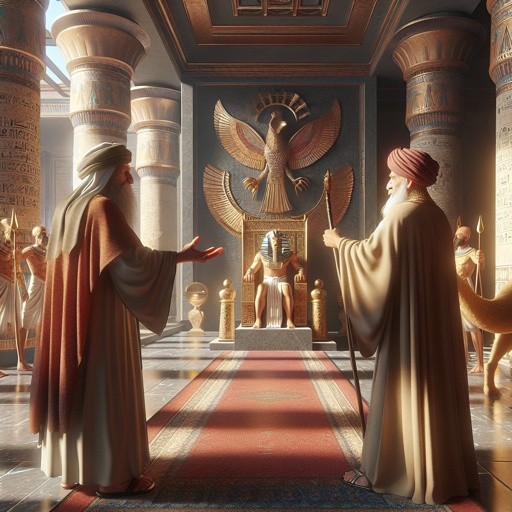 It is after this conversation that we read about the Lord confronting Moses as if He were going to kill him. Once Zipporah had circumcised their son, Moses was released from his fear that God might kill him and so he was safe to go to Egypt and do the Lord’s work in complete faith being “fully convinced that God is able to do whatever He promises.” Right after this, we read “Now the LORD had said to Aaron, ‘Go out into the wilderness to meet Moses.’ So Aaron went and met Moses at the mountain of God, and he embraced him” (Verse 27). How patient is our Father in heaven with us. He stoops, not only to meet us in our weaknesses and lack of faith, but also in our strange pagan ideas, reconciling our dilemmas that we might further believe in His love and protection!
It is after this conversation that we read about the Lord confronting Moses as if He were going to kill him. Once Zipporah had circumcised their son, Moses was released from his fear that God might kill him and so he was safe to go to Egypt and do the Lord’s work in complete faith being “fully convinced that God is able to do whatever He promises.” Right after this, we read “Now the LORD had said to Aaron, ‘Go out into the wilderness to meet Moses.’ So Aaron went and met Moses at the mountain of God, and he embraced him” (Verse 27). How patient is our Father in heaven with us. He stoops, not only to meet us in our weaknesses and lack of faith, but also in our strange pagan ideas, reconciling our dilemmas that we might further believe in His love and protection!


.jpg)
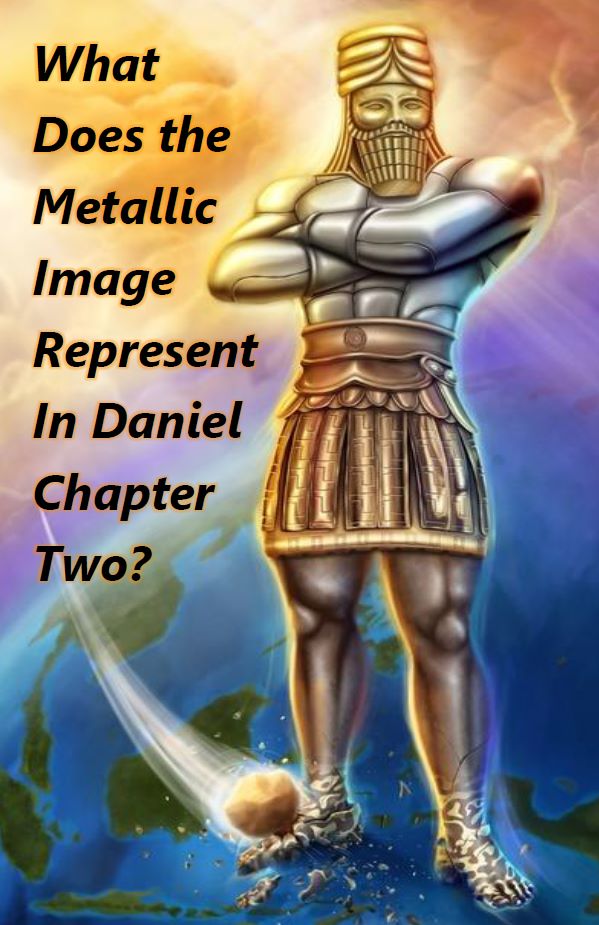
.jpeg)

